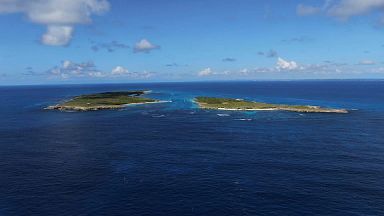Smart Regions finds out about a European project that is working to protect the natural habitats of a small reserve in the French Caribbean.
The French reserve of Petite Terre in Guadeloupe in the Caribbean is a tropical paradise. The two uninhabited islands are home to around a third of the world’s population of the Lesser Antillean Iguana. But the reserve’s rich biodiversity is increasingly at risk from tourism and climate change. A European Project is attempting to protect the islands by monitoring the effects of these threats.
"Last year, we carried out a marine environment survey, which identified an Elkhorn coral colony. This year, the scientists decided to carry out a longer and more detailed survey of this colony in order to monitor its evolution in terms of exposure to tourism and the potential impacts of climate change," explains scientific officer Léa Sebesi.
The project has a budget of just over half a million euros. Around 70 percent of that comes from the European Cohesion Policy. The reserve is made up of 842 hectares of sea and 148 hectares of land.
165 bird species
Anthony Levesque, an ornithologist, has been studying the reserve for the past 23 years. He says he's noticed a decline in bird numbers, especially among certain species. It's a trend he is determined to reverse.
"It's not all bad news,'' he says, adding: "Fortunately, we’ve got the example of the Least Terns. Not only have we been able to increase, or at least stabilise, the number of pairs that settle down every year to breed, but above all, thanks to the installation of platforms, we have dozens and dozens of chicks that fledge every year, and that alone is really fantastic."
Strictly protecting natural habitats.
Getting to Petite Terre is only possible by boat and anchoring is strictly prohibited to protect the coral.
The guides that are allowed to give tours of the reserve must also clearly explain to tourists the fragility of the local ecosystem in the limited area of Terre de Bas. The other island of Terre de Haut is completely off limits to the public.
Established in 2002, the Titè Association helps to co-manage the reserve with the National Forest office (Office National des Fôrets). Alain Saint-Auret is the Head Guard.
"The regulations are very strict. People have absolutely no right to take things - anything at all. When an infringement takes place the police can fine a person up to 1,500 euros. If they refuse to cooperate the penalty can rise to 75,000 euros."
Much is being done to protect Petite Terre’s outstanding natural beauty. Without question a paradise, but a fragile one.












